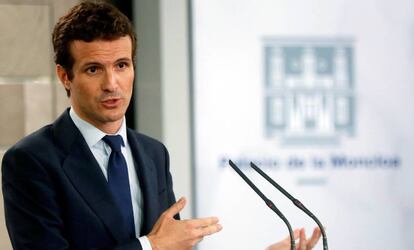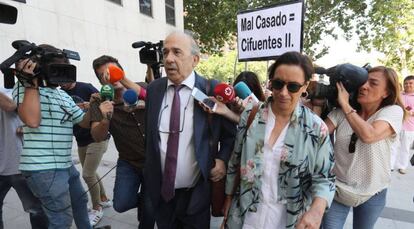Spain’s PP leader faces new legal setback over suspect master’s degree
Judge sends case to Supreme Court after finding signs of wrongdoing in Pablo Casado’s academic qualification

The investigation into a master’s degree obtained in 2009 by Pablo Casado, the new leader of Spain’s Popular Party (PP), is on its way to the Supreme Court.
In a Monday decision, an investigative judge from Madrid sent the case to a higher court because of immunity laws protecting Casado from the lower courts as an elected official, known in Spanish as aforamiento. The Supreme Court will now decide whether to proceed with the case.
What they’ve done to me, they haven’t done to anyone else in this country or in any other country
PP leader Pablo Casado
Judge Carmen Rodríguez-Medel found signs of wrongdoing in the way that Casado obtained a postgraduate degree in regional law from the Public Law Institute (IDP) at Universidad Rey Juan Carlos (URJC), a public university in Madrid.
The crimes that Casado would face if the case prospers are cohecho impropio – accepting a gift that is offered because of one’s public position – and prevaricación administrativa – for abetting unlawful decisions by civil servants. Casado was a regional deputy at the time.
The PP leader is one of several politicians and public officials who obtained the same degree from a law school that has come under scrutiny for the way it handed out academic qualifications over the course of several years. One recipient, former Madrid premier Cristina Cifuentes, was forced to resign when the scandal broke. There are now seven people under investigation in connection with the degree, including teachers and former students.

The PP leader has admitted that he did not go to class, take exams or defend a dissertation before a panel, as other students were made to do. The university automatically waived 18 of his 22 classes – more than 80% of the coursework – on the basis that he already had a degree in law from Madrid’s Complutense University. He only had to produce four papers whose existence is also being questioned.
Cifuentes case
The case builds on a similar scandal that forced Cristina Cifuentes, also of the PP, to resign as regional premier of Madrid when it emerged that she had obtained the same degree without going to class or taking exams. Other irregularities concerning her final thesis have led to a criminal probe by prosecutors over alleged forgery of public documents by university officials at URJC.
Sánchez asks for explanations
In a public appearance on Monday, Prime Minister Pedro Sánchez of the Socialist Party (PSOE) said that Casado “should provide citizens with explanations” regarding his master’s degree, which will now be investigated by the Supreme Court. However, he declined to make any further assessments. “That’s all I’ve got to say,” he said.
The investigating judge says there are sufficient signs to conclude that this degree was routinely used “as a gift or perk” awarded to students “with a relevant political or institutional position, or who had close personal or professional ties” with Enrique Álvarez Conde, the former head of the Public Law Institute and a chief target of the larger investigation into wrongdoing at URJC.
Last week, the court heard testimony from three alumni who obtained the same degree, and whose academic obligations were also largely waived. One of them admitted that she was granted the degree without actually doing any work. One of these former students is Alida Mas Taberner, who at the time was a deputy secretary at the Valencia regional government, then under PP rule.
The investigating judge considers that there was a group of privileged students who were granted special favors while the others were forced to go to class and do all the coursework. “The same dynamics were at play in other graduating classes,” wrote the judge, alluding to former Madrid premier Cifuentes, who obtained her degree in 2012.
“[Álvarez Conde is], in this investigating judge’s opinion, the person who appears to have designed this system of perks in which academic degrees were given away,” wrote Rodríguez-Medel about the former institute director. “The students picked up the diploma or used it in full knowledge that there was no academic merit behind it.”
Political persecution
But Casado, who won his party’s leadership at a vote on July 21, says that this latest legal setback does not affect his political career. “I have not considered stepping down, not in the least,” he said at a media conference on Monday at party headquarters.
Instead, the 37-year-old conservative leader portrayed himself as the victim of political persecution. “What they’ve done to me, they haven’t done to anyone else in this country or in any other country. I am not under investigation by any court, and there is no evidence of guilt against me.”
Casado insisted that the investigation into his academic degree is “completely irrelevant” and that he himself was a regional deputy at the time, with no power to benefit the university politically.
But the judge’s decision has forced him to delay his trip to Colombia, where he was planning to attend the inauguration of the new president, Iván Duque.
In her legal reasoning, Judge Rodríguez-Medel detailed the steps that she feels are “necessary to clear up the facts:” to summon Casado to a hearing, ask him to produce all surviving documents pertaining to his degree, including the four papers that he claims to have written, and to hand over the laptop where he filed these documents.
English version by Susana Urra.
Tu suscripción se está usando en otro dispositivo
¿Quieres añadir otro usuario a tu suscripción?
Si continúas leyendo en este dispositivo, no se podrá leer en el otro.
FlechaTu suscripción se está usando en otro dispositivo y solo puedes acceder a EL PAÍS desde un dispositivo a la vez.
Si quieres compartir tu cuenta, cambia tu suscripción a la modalidad Premium, así podrás añadir otro usuario. Cada uno accederá con su propia cuenta de email, lo que os permitirá personalizar vuestra experiencia en EL PAÍS.
¿Tienes una suscripción de empresa? Accede aquí para contratar más cuentas.
En el caso de no saber quién está usando tu cuenta, te recomendamos cambiar tu contraseña aquí.
Si decides continuar compartiendo tu cuenta, este mensaje se mostrará en tu dispositivo y en el de la otra persona que está usando tu cuenta de forma indefinida, afectando a tu experiencia de lectura. Puedes consultar aquí los términos y condiciones de la suscripción digital.








































